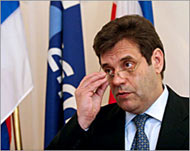ICG: Serbia reviving Milosevic legacy
An independent thinktank has accused Serbian Prime Minister Vojislav Kostunica of reviving regressive Milosevic-era policies.

Kostunica is “rehabilitating” aspects of the ousted government of nationalist strongman Slobodan Milosevic and endangering Balkan stability, the Brussels-based International Crisis Group (ICG) said.
In a new report on Tuesday, the ICG said Kostunica’s government deserved credit for handing over suspects to the UN war crimes court at The Hague but otherwise its policies were “regressive”.
“Overall, the government of Premier Vojislav Kostunica still appears intent on rehabilitating significant portions of the Milosevic legacy by appointing Milosevic era personnel in the police, judiciary and military … ” it said.
“Until it faces up to the real meaning of that legacy, its relations with other parts of the one-time Yugoslav state and the stability of the western Balkans will be uncertain and Serbia will not be able to create stable relationships with its neighbours.
Military beyond control
“On a range of technical issues that are vitally important to potential integration with Europe, Serbia has been regressing since the Kostunica government came to power in March 2004.”
 |
|
Premier Kostunica is accused of |
It said judicial reform had stalled and the courts had become increasingly politicised, while the police and military remained “beyond democratic, civilian control”.
A draft constitution which Kostunica has made a centrepiece of his platform “threatens to move Serbia further away from Europe“, the ICG said.
The analysis noted that Kostunica’s minority government depended for its survival on the “silent partnership of parties that are still loyal to Milosevic and his fellow (war crimes) detainee … Vojislav Seselj”.
International pressure necessary
“Strong, coordinated international pressure will be necessary to prevent further backsliding,” it said.
Former Serbian and Yugoslav president Milosevic helped to unleash a brand of nationalism in the Balkan republic in the early 1990s that fuelled inter-ethnic wars that shattered the Yugoslav federation.
Ousted from power by a popular uprising in 2000, he is currently on trial at the inter-ethnic wars that shattered the Yugoslav federation.
The ICG said Kostunica, who opposed Milosevic’s extradition to The Hague and has described the tribunal as an anti-Serb witch-hunt, had begun to meet international demands for the transfer of other indictees.
“Cooperation [with The Hague tribunal] has improved but remains superficial, while domestic efforts on war crimes trials are feeble,” it said.
The Serbian government could not be reached for comment.
No-confidence vote dismissed
Meanwhile, in a boost to Prime Minister Vojislav Kostunica’s government, Serbia‘s parliament on Tuesday dismissed an opposition bid for a no-confidence vote in the Cabinet.
The ultranationalist Serbian Radical Party had demanded that Kostunica’s government be ousted over the extradition to the UN war crimes tribunal earlier this year of a Serb police general.
|
“Why have a parliament if you can’t open a debate about the government?” Tomislav Nikolic, |
The nationalists had alleged that General Sreten Lukic was handed over to the tribunal in The Hague, Netherlands, against his will, despite government claims that he left voluntarily.
The Radicals’ motion against the government won support from pro-Western Democratic Party, which is also critical of Kostunica.
But in a vote Tuesday, 126 deputies in Serbia‘s 250-member parliament refused to include the opposition motion on the assembly’s agenda.
Waste of time
Kostunica’s ruling coalition argued that a days-long debate on the work of the government would only be a waste of time.
The opposition, however, insisted that the refusal to open a no-confidence debate was against the law and a sign of weakness.
“Why have a parliament if you can’t open a debate about the government?” said a Radical leader, Tomislav Nikolic. The Serbian nationalists remain highly critical of the Hague tribunal, saying it is anti-Serb.
Under international pressure, Kostunica has in the past several months orchestrated the transfer of more than a dozen Serb suspects sought by the court.
The two top Serb suspects, Bosnian Serb wartime political leader Radovan Karadzic and his military commander Ratko Mladic, still remain at large.